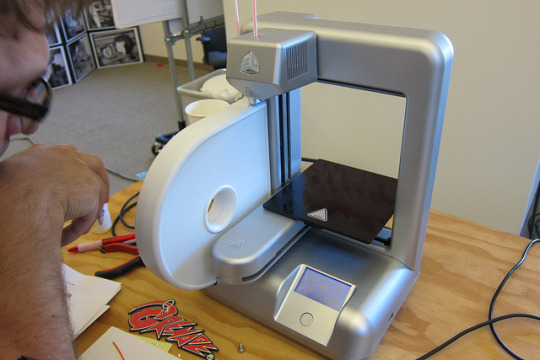
During the slow news week at the very end of last year, 3D Systems announced that they were stepping away from their consumer-oriented Cube desktop 3D printer. Since the Cube is designed to only accept printing filament made by 3D Systems, as part of winding down the Cube - and as an act of good faith to Cube owners - 3D Systems should explicitly open the doors to third party filament. This can take the form of two simple public commitments. First, 3D Systems can promise not to sue any Cube users who use non-3D Systems filament for the Cube. Second, 3D Systems can promise not to sue anyone who wants to make and sell filament that will work with the Cube. Doing both requires circumventing the verification chip that 3D Systems includes in its filament today.
Although I don’t have a Cube myself, I’ll admit that I have more than a passing interest this issue. For most of last year, first as part of Public Knowledge and later in my personal capacity, I was involved in a process at the US Copyright Office designed to “jailbreak” 3D printers. The idea was that if you bought a 3D printer the printer manufacturer shouldn’t use the threat of a copyright lawsuit to prevent you from going somewhere else for filament. To 3D Systems’ credit (and in contrast to Makerbot parent company Stratasys), they took no steps in opposition to this effort.
The Copyright Office ultimately agreed that a printer manufacturer shouldn’t be able to use copyright to force you to buy filament from them (well, mostly – it’s a long story). In part, this was because the Copyright Office recognized that locking users into a single approved source of filament artificially inflated prices and prevented innovative new filaments from entering the market.
Now that 3D Systems is backing
away from the consumer market, what does it mean for all of those people
who thought they were relying on 3D Systems for filament cartridges? 3D Systems says that they will continue to
sell materials, but how long might that last?
And, with the company turning away from the consumer market, how likely
is it that any new filaments will make it into that marketplace? There is no reason that Cube users should
have to rely on 3D Systems’ waning interest to keep their printers useful in
the future.
Truth be told, I believe that neither Cube users who make use of third party filaments nor those third parties who would sell Cube-compatible filament to the public are violating laws today. However, it is also quite possible that the prospect (and cost) of having to prove that legality in court will keep some people from dealing with third party filaments at all. A clear statement of support from 3D Systems for both using and making third party filament could make it much easier for Cube owners to use their printers well into the future.
3D Systems decided experiment with locking filament in the consumer market, and for whatever reason they have decided to end that experiment. There is nothing wrong with that. However, their decision to use locking created an increased obligation to Cube users after the experiment ends. Regardless of how long they plan on selling their proprietary filament, it would be a worthwhile gesture to its community to formally announce that it would not prevent anyone from using third party filament in the Cube and that they would not go after any company that wants to step in to make compatible cartridges going forward. Just because 3D Systems is moving on, digital locks shouldn’t force everyone else to move on too.